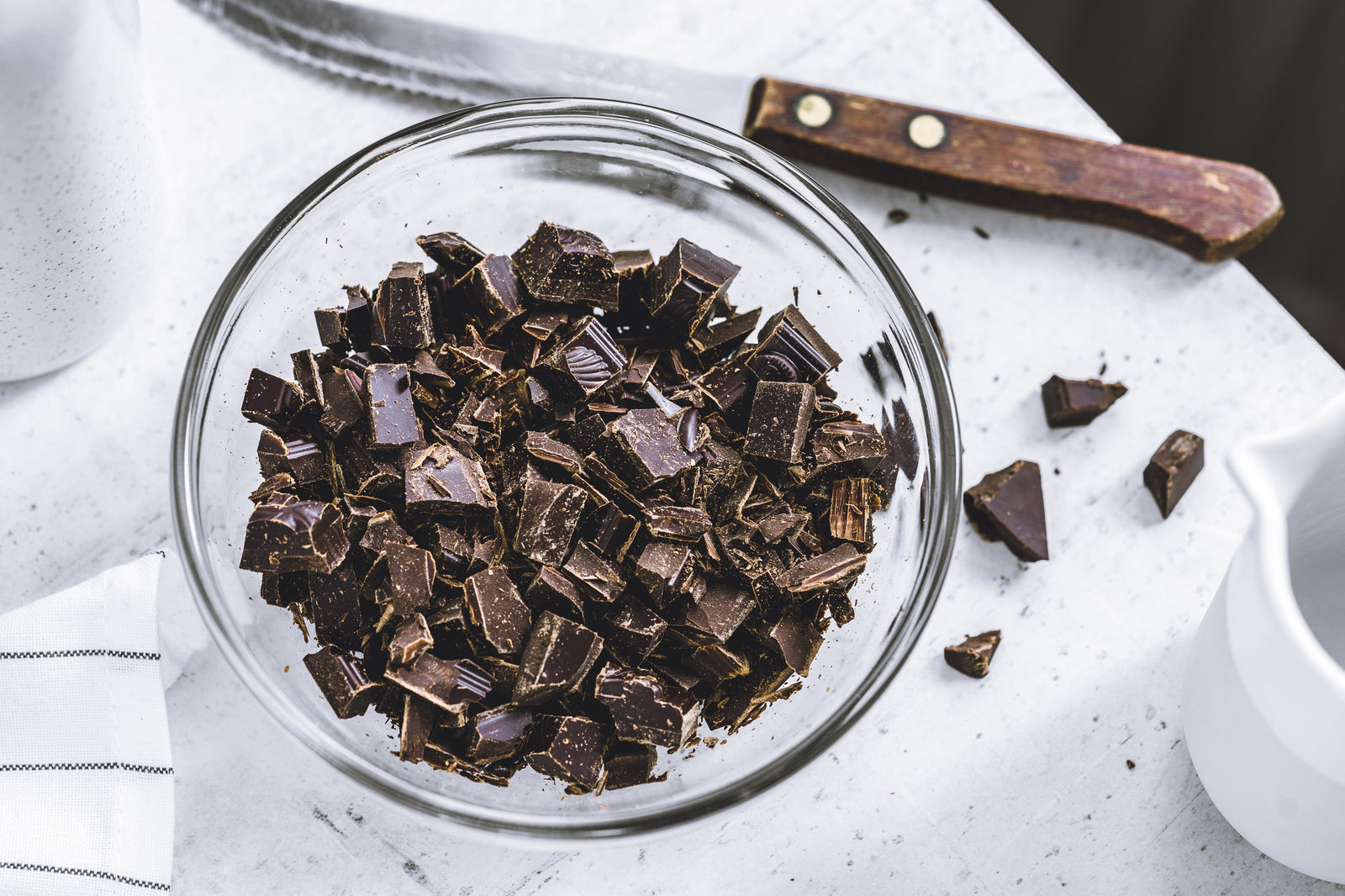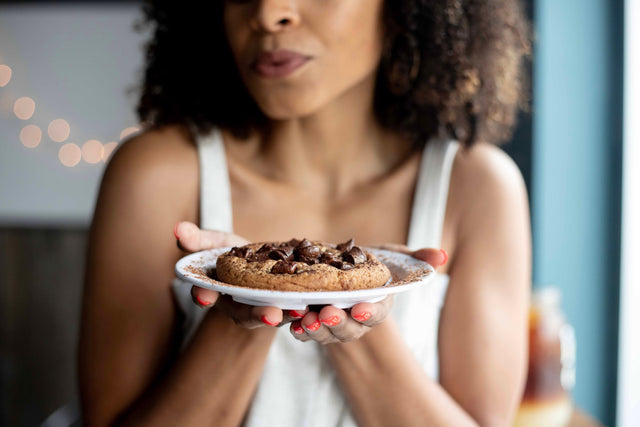SIDE NOTE: Before you head out and start taking down dark chocolate bars every day, it’s important to note that the portion size of the dark chocolate still matters, and if you overdo it the health benefits can be negated by the extra fat, sugar, and calories.
What Is Dark Chocolate
Dark chocolate is a bitter, healthful treat. Cocoa powder is made by removing some of the cocoa butter from the liquor, a paste made from ground, roasted, shelled, and fermented cocoa beans (called nibs). Cocoa liquor is what is referred to as “percent cacao” on the packaging of a dark chocolate bar.
The more bitter, the better the dark chocolate health benefits you’re going to reap. The bitter taste is thanks to a number of flavonoids that dark chocolate is particularly rich in — specifically, flavanols (flavan-3-ols). [R] Dark chocolate has the highest amount of cocoa flavonols, aka phenolic antioxidants, as compared to other forms of chocolate. Flavonoids, including catechin, epicatechin, and procyanidins, are mainly responsible for antioxidant activity. [R]
How Is Dark Chocolate Different Than Milk Chocolate?
Chocolate is made from combining both the cocoa liquor with cocoa butter and sugar. Milk chocolate is made with the addition of condensed or powdered milk to the mix. [R] Dark chocolate doesn’t have any added milk solids and contains a higher amount of cocoa. In order for a chocolate to be called milk chocolate, it must be 12% or more milk.
Semisweet or bittersweet chocolate is often referred to as dark chocolate and must contain no less than 35% by weight of cocoa liquor. White chocolate contains only cocoa butter (at least 20% by weight) combined with sweeteners and dairy ingredients. [R]
The History Of Dark Chocolate Health Benefits
Foods and beverages made for the Theobroma cacao tree have been known to be consumed as early as 460 AD! [R] Dark chocolate was used as both a primary remedy or as a way to help deliver other medicines at the same time. Originating in Mesoamerica, dark chocolate was used by indigenous peoples and diffused up into Europe around the mid-1500s. [R] Between the 16th and 20th centuries, there were well over 100 documented uses for cacao/chocolate as a medical treatment. [R]
Of the 100 uses, these were the top three [R]:
- To induce weight gain in emaciated patients
- To stimulate the nervous system
- To improve digestion and elimination
That being said, the majority of conclusive research has been done over the last decade with a primary focus on the relationship between cocoa consumption and cardiovascular risk. [R] More recently, there has been some discovered insight into the potential benefits of cocoa into the other areas of the body, including the organs and the psychological effects.
RELATED ARTICLE: How To Naturally Increase Insulin Sensitivity

What Is Dark Chocolate Good For
Overall, research to date suggests that the health benefits of eating dark chocolate or moderate cocoa likely outweigh the risks. The cocoa solids in dark chocolate have been shown to mediate cardiovascular effects, providing anti-inflammatory benefits and may directly influence insulin resistance, and in turn, the risk for diabetes. [R]
Furthermore, cocoa consumption may stimulate changes in redox-sensitive signaling pathways involved in gene expression and the immune response, protecting nerves from injury and inflammation, protecting the skin from oxidative damage from UV radiation, and has beneficial effects on satiety, cognitive function, and mood. [R]
To fully understand the health benefits of eating dark chocolate, we've taken a look at the science and broken it down.
RELATED ARTICLE: 6 of the Best Natural Sources of Caffeine Other Than Coffee
Dark Chocolate Benefits
1. High Nutrient Content
Dark chocolate is best when consumed in moderation. While yes, it does have a high nutrient content, it can pack a punch with a 100-gram bar (3.5 ounces), this is higher than the daily recommended amount to receive the dark chocolate health benefits you came to this article looking for.
Total Omega-3: 34.3mg
Total Omega-6: 1230mg
Iron: 67% RDI
Magnesium: 58% RDI
Copper: 89% RDI
Manganese: 98% RDI
Zinc: 22% RDI
Protein: 7.9g
Sterols: 2.0mg
Caffeine: 80.8mg
Theobromine: 810mg
2. High Antioxidant Levels
Dark chocolate health has quite a big of organic compounds that are biologically active and function as antioxidants. Cocoa and dark chocolate can have more antioxidants than many other fruits tested in the study, which included acai berries and blueberries. [R] The antioxidants that provide dark chocolate with its health benefits include polyphenols, flavanols, and catechins, as well as a few others. [R]
RELATED ARTICLE: The Benefits of a Powerful Antioxidant, Astaxanthin
RELATED PRODUCT: Apple Cider Vinegar Gummies
3. Improved Blood Flow and Reduced Blood Pressure
The flavanols in dark chocolate have been found to actually stimulate the lining of arteries (endothelium) producing nitric oxide (NO). [R] Why is this beneficial? Well, nitric oxide is responsible for sending signals of relaxation to the arteries, improving blood flow, and reducing blood pressure. [R]
While the data is relatively small, it’s recommended to include small amounts of polyphenol-rich dark chocolate as part of a usual diet to efficiently reduce blood pressure and improve the formation of vasodilative nitric oxide (NO). [R, R, R]
RELATED ARTICLE: Blood Flow Restriction Therapy For Athletes
4. Reduced Risk Of Heart Disease
The relationship and benefit of flavanols and cocoa/dark chocolate consumption and heart disease have been researched quite extensively in the last 30 years. While they are observational studies, check out some of the findings:
One study with 470 elderly male participants, cocoa consumption reduced the risk of death from heart disease by 50% over a 15 year period. [R] Another study showed that eating chocolate two or more times per week lowered the risk of having calcified plaque in the arteries by 32%.[R] Lastly, another study showed that eating dark chocolate more than 5x per week lowered the risk of heart disease by 57%. [R]
While it’s pretty hard to conclude that dark chocolate was the only contributing factor, given the nutrients in dark chocolate it is definitely plausible that regularly eating small amounts of dark chocolate throughout the week can contribute to a reduced risk of heart disease long term.
5. Protection Against UV Damage
As mentioned earlier, is it found that the high amounts of flavanols in cocoa can provide photoprotection against UV damage from the sun. Some studies have shown that when flavanols are regularly consumed, blood circulation is improved and there can be a decrease in skin roughness, skin density, and hydration. [R] A double-blind in vivo study in 30 healthy subjects over 12 weeks found that regularly consuming chocolate rich in flavanols provided significant photoprotection from the harmful UV effects on the skin, whereas conventional chocolate has no such effect. [R]
How Much Dark Chocolate Should You Eat
The health benefits of eating dark chocolate are much greater than milk chocolate, however, it is important not to consume too much at once as it will negate the added benefits. With dark chocolate, you’re not only limiting unnecessary sugar intake, but you’re increasing your consumption of stearic acid, a saturated fat that appears to have a neutral effect on blood cholesterol.
We recommend buying chocolate that is at least 60% cacao and keeping in mind that the higher you go in percentage, the more flavanols there will be in the batch. Additionally, we recommend choosing natural cocoa over Dutch-processed cocoa. The reason? Dutch is treated with an alkali, a compound that neutralizes acid and takes away the strong bitter flavor, but also strips the chocolate of the dark chocolate health benefits the flavanols deliver.
All in all, we recommend limiting portions of dark chocolate to ~1 ounce daily or a few times a week, which adds up to ~150 calories in total. Everything in moderation, right?
RELATED ARTICLE: Dark Chocolate Raspberry Brownie Protein Overnight Oats Recipe
Dark Chocolate Health Benefits: Takeaway
If you’re going to eat chocolate, you now have 5 really good reasons to opt for dark chocolate instead. Not only does cocoa contain more antioxidants than most foods, but it also has a favorable impact on nitric oxide production, blood pressure, blood flow, and even helps positively influence insulin resistance. Long term, small amounts of dark chocolate eaten regularly can protect the skin against UV damage and provide a reduced risk for health disease.














